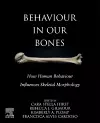
Behaviour in our Bones
4 contributors - Paperback
£97.99
Dr. Cara Hirst earned her PhD in dental and skeletal bioarchaeology from University College London. Her research focuses on bone remodelling and biomechanical alterations to the human skeleton and inference of behaviour and activity from skeletal morphology. While her specialty is 3D geometric morphometrics and human mandibular morphology, she is interested in a range of methods and behaviours that may be inferred from skeletal morphology. She has presented at numerous conferences and published research papers and chapters for edited books. Dr. Rebecca Gilmour received her PhD from McMaster University in 2017. She is Assistant Professor of Biological Anthropology at the Mount Royal University in Calgary, Alberta, Canada (Department of Sociology and Anthropology). She specialises in bioarchaeology, palaeopathology, and biomechanical analyses of the human skeleton and her research brings together studies of behaviour and activity with those of health and disease. Recently, she has focussed on investigating the long-term consequences of trauma in human skeletal remains. Through her work, she seeks to improve how we understand past and present human resilience, risk, impairment, and adaptation. Dr. Francisca Alves Cardoso received her PhD from Durham University in 2008. She is Senior Research Fellow and Coordinator of the Laboratory of Biological Anthropology and Human Osteology at CRIA – Centre for Research in Anthropology in Portugal and Invited Guest Lecturer at the Faculty of Social Sciences and Humanities at Universidade Nova de Lisboa, Portugal. Her research focuses on how skeletal biology is used to comprehend and reconstruct past human health and wealth, and how social and cultural constructs may be perceived by the analysis of human remains. In recent years she has also explored ethical issues related to the study/use of skeletal biology and human skeletonised remains in science, technology, and humanities and its impact in society. Dr. Kimberly Plomp received her PhD from Durham University in 2013. She is Associate Professor and Head of the Human Osteoarchaeology Laboratory in the Archaeological Studies Program at the University of the Philippines. Her research interests are broad and encompass many topics related to biological anthropology, such as bioarchaeology, palaeopathology, evolutionary medicine, functional anatomy, and human evolution. Currently, her projects focus on identifying evolutionary explanations for common health problems such as back pain, osteoarthritis, and developmental conditions as well as using human shape variation to trace past dispersals and migrations.